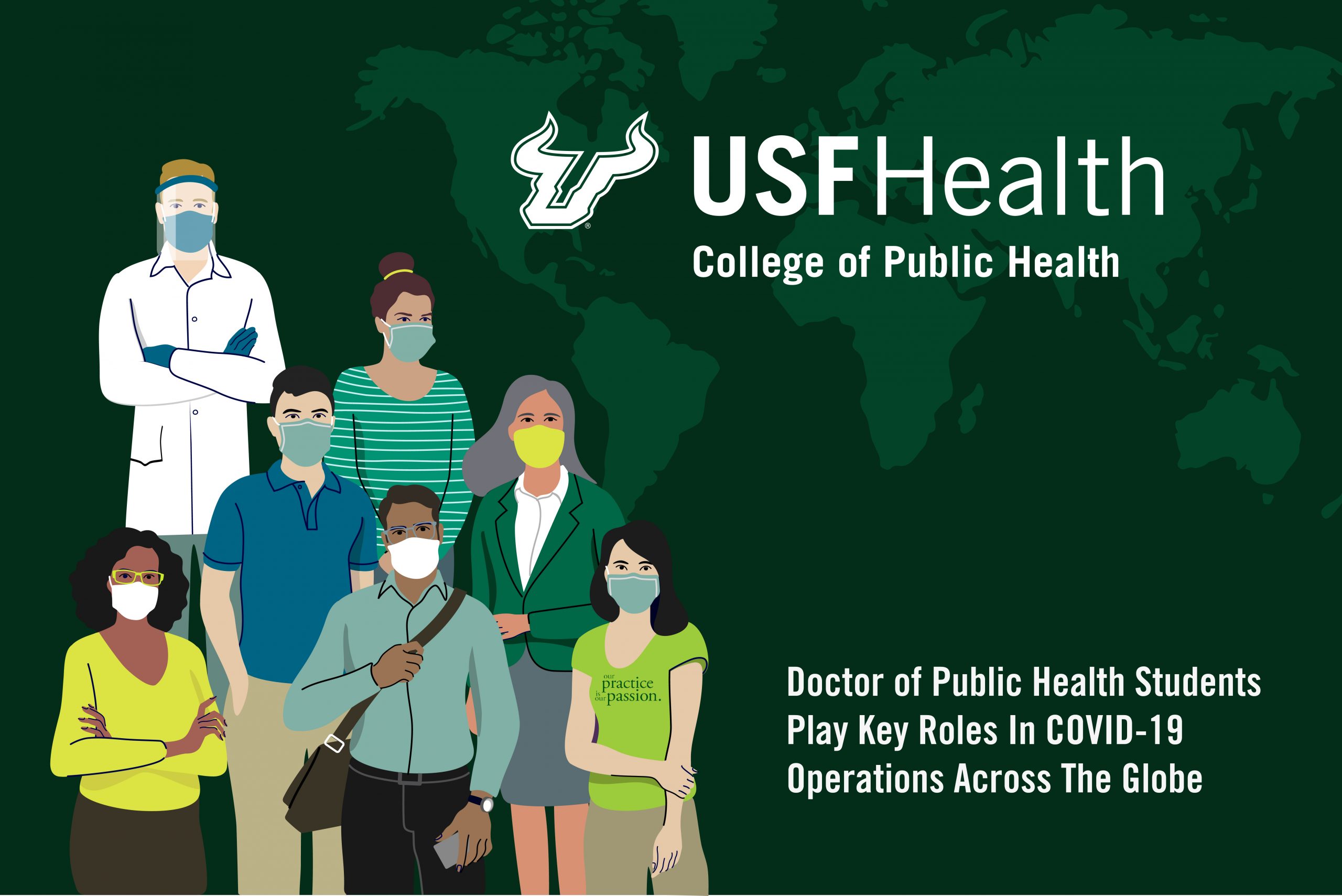
To view Part I of this story, click here.
The USF Health College of Public Health (COPH) Doctor of Public Health (DrPH) program emphasizes advanced public health education and training designed to prepare individuals for leadership roles in practice-based settings. Traditionally, the program is taught through a hybrid format of primarily distance-learning courses and three, five day on-campus institutes, but COVID-19 forced these live in-person institutes to shift to virtual delivery in 2020 through Microsoft Teams. The program is designed for working professionals in the public health field, with most recent cohorts averaging five or more years of field experience, to gain the opportunity to connect and collaborate with other doctoral students in both the DrPH and PhD programs and strengthen their skills for public health leadership, practice and research without interrupting their careers. These doctoral students come from a wide range of fields including epidemiology, county and state level disaster and emergency preparedness and response, health education, health law, laboratory operations management, maternal and child health, social work, food insecurity, and others. They work across federal and state government agencies along with local county health departments, healthcare organizations, non-profits, universities, consulting practices, to name a few.
COVID-19 clearly had other plans in mind for the program and for the careers of current USF Health DrPH students who immediately became key parts of COVID-19 operations across the country and abroad. These students stepped up, represented public health in their organization’s interprofessional teams and really demonstrated the College of Public Health’s motto, “our practice is our passion.” The following biographical sketches provide summaries of the backgrounds and a focus on the roles these DrPH students are contributing in their communities in the fight against COVID-19.
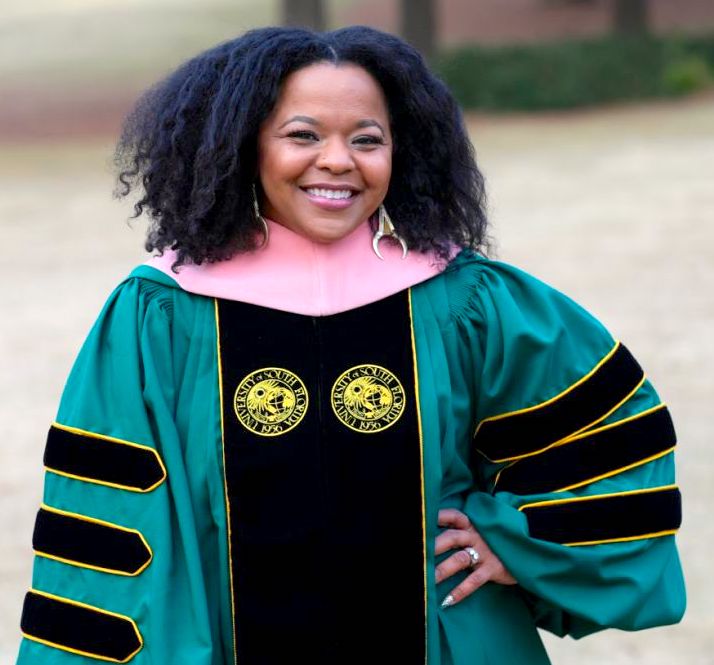 Shara Wesley, DrPH, MPH
Shara Wesley, DrPH, MPH
Executive Director of the Center for Health Equity (WCHE) and Community Health Department, WellStar Healthcare System
ATLANTA, GA – Dr.Wesley leads new and expansions of current initiatives that address social determinants of health and health equity with the goal of reducing systemic disparities and their impact on communities for WellStar, one of the largest integrated healthcare systems in Georgia. Supported by an interdisciplinary team, Dr. Wesley helped to launch COVID pop-up testing sites, a mobile food market, a Community Transformation Program and a Health Equity Series. “COVID has reinforced the power of enhancing collaboration and effective partnerships among all sectors and stakeholders,” Dr. Wesley said. “Our country is highly interconnected; we are all part of an interdependent system, where the sharing of ideas, information, knowledge, and movement people and of goods, are truly boundless. This interconnectedness is also the basis for our health system, and as any system, the strength of all parts is crucial.”
The initial efforts in the summer were focused on increasing COVID testing accessibility in communities of color by deploying small teams to neighborhood-based pop-up sites to offer drive up and walk up COVID testing. Safety kits were also available at these sites and included a mask, hand sanitizer, and information from the CDC. “Oftentimes, these sites were faith-based organizations that are a part of WellStar’s Congregational Health Network,” Dr. Wesley said. “We found that offering these smaller events allowed us to be flexible so we could be deployed to any hotspots and ensure we were offering culturally/linguistically appropriate education.”
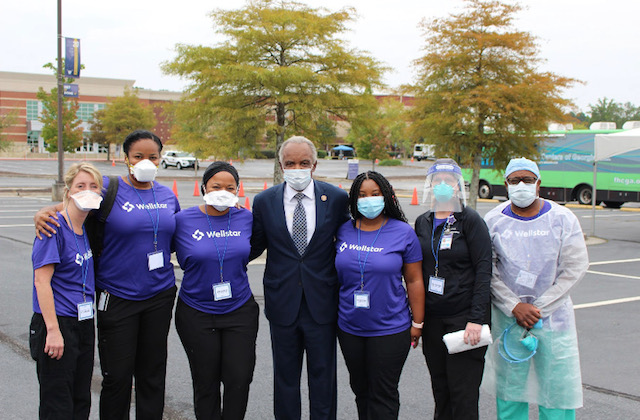
Dr. Shara Wesley, third from left, with her Wellstar team and Georgia Congressman David Scott (center), during a COVID-19 pop-up testing and food distribution event. (Photo courtesy of Wesley)
COVID testing is not the only pop-ups Dr. Wesley’s team has brought to Atlanta. Through their 2019 Community Health Needs Assessment (CHNA), Dr. Wesley’s team knows that many of their community members are struggling with consistent food access or food insecurity and that has only been exacerbated by COVID. “By partnering with Goodr, we will begin hosting seven monthly markets that offer a free grocery shopping experience for 700 families,” Dr. Wesley said.
In addition, they successfully launched their Community Transformation Program which is piloting five initiatives that leverage the use of technology to increase access to healthcare and/or social support. “The COVID-19 pandemic unmasked dramatic disparities, with African Americans and Latinx community members accounting for a disproportionate share of COVID-19 infections, hospitalizations, and deaths,” Dr. Wesley said. “Crises often amplify existing inequities and highlight the urgent need to address the root causes of health inequities.” WellStar Health System’s Center for Health Equity and the Georgia Health Policy Center hosted a six part webinar series focused on achieving equity in Georgia, in partnership with the Atlanta Regional Collaboration for Health Improvement and the Partnership for Southern Equity. “This series will engage community, clinical, and other partners in building a community-level understanding of health equity by exploring the root causes of common and persistent inequities and providing evidence-informed, practical tips and tools to address these inequities in Georgia,” Dr. Wesley said.
Now in 2021, the team will shift focus to add COVID vaccination education and, when available, administration. Dr. Wesley hopes to create an openness to receiving the vaccine but is faced with the challenge of the general public’s confusion about the virus and wanting to “wait and see” before receiving the vaccination, combined with Black Americans’ longtime mistrust of the medical community. “We know it is important for the community to see and hear public health leaders share their reasons for receiving the COVID vaccination,” Dr. Wesley said. “It is equally important that we also empathetically listen to their reservations and in response offer science-informed information.”
Dr. Wesley’s educational background includes a Bachelor of Science in Biology with a minor in Chemistry in addition to a Master’s in Public Health. In 2017, she enrolled in USF Health’s DrPH program with a concentration in Advanced Practice Leadership, “because I wanted to reinforce what I learned in the field with contemporary applications of public health research,” Dr. Wesley said. Fortunately for Dr. Wesley, she completed most of the program prior to COVID and was able to participate in the in-person summer institutes which she recalls as her favorite part of the program. “While they were often intense and loaded with information, it was a great time to reconnect with the USF Health COPH community, faculty and staff,” Dr. Wesley said. “The endless conversations helped demystify coursework or program requirements because you could troubleshoot in real time with other students.” A small group of the 2017 DrPH Cohort have remained connected via WhatsApp, providing each other with encouragement to stay focused on the heightened demand in their careers and the DrPH graduation requirements.
Wesley closed out 2020 in celebratory fashion when she was deemed one of “Georgia’s best and brightest” with the prestigious 40 Under 40 award from Georgia Trend, followed by successfully defending her DrPH dissertation: Black Women Podcast Listenership and its Impact on Psychological Openness, Help-Seeking Propensity and Indifference to Stigma.
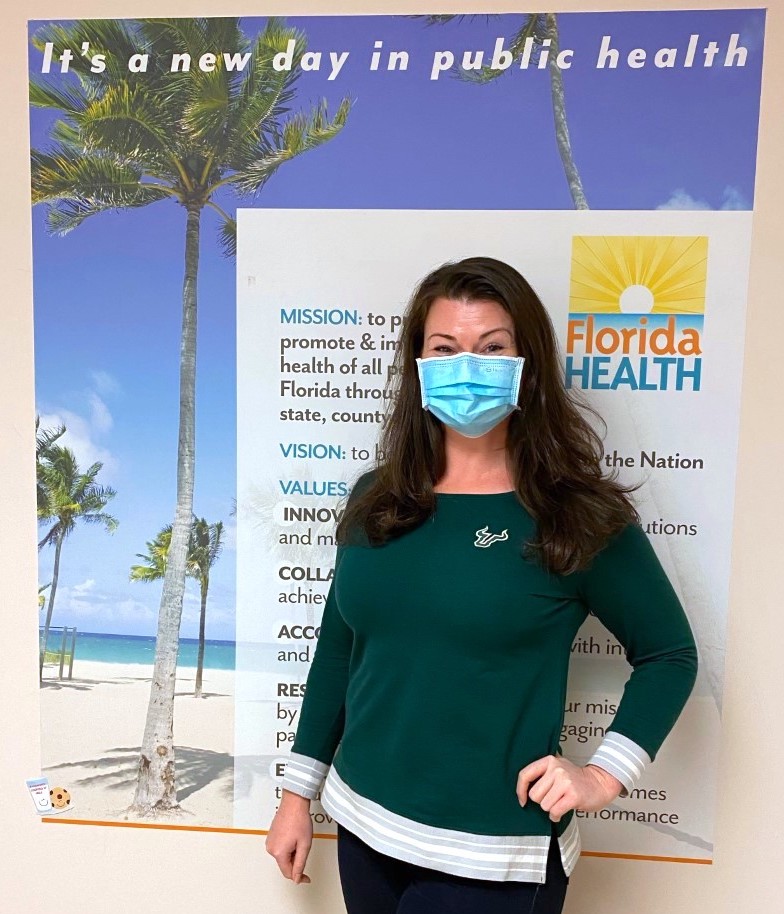 Meaghan K. Crowley, MPH
Meaghan K. Crowley, MPH
Director of Community Health for the Florida Department of Health (DOH)
MARION COUNTY, FL – Crowley has always wanted to work in public health ever since she was 7 years old and saw the movie, And The Band Played On. “I used to tell everybody, ‘I want to be an epidemiologist and virologist for the CDC and work on level 4 contagions,’” Crowley said. She used to work in global health and then she ended up moving to Florida and working for the Florida Department of Health (DOH) and falling in love with community health.
For the DOH, forming an Incident Management Team (IMT) is common practice for emergency response situations such as hurricanes or a Hepatitis A outbreak. IMTs follow the Federal Emergency Management Agency’s (FEMA) Incident Command System (ICS) Structure and contain the core leadership group that is going to be in charge of planning the response and then putting it into action. At the top of the chain of command is the Incident Commander followed by the Operations Chief, Logistics Chief, Medical Officer, Community Liaison, Public Information Officer (PIO) and finally, any additional roles as needed to respond to the emergency situation. The COVID IMT was formed in December 2019 when the news of COVID-19 first broke so when Florida reported its first case on March 20th, 2020, the IMT was already built out and it was time to put their plans into action. Within the structure of the COVID IMT, Crowley is the Community Liaison. Even though IMTs exist year-round, “they’re usually for acute issues like hurricanes,” Crowley said. “Even for the year and a half outbreak of Hepatitis A, the IMT only needed to meet once a week. The COVID IMT meets twice a day, every day and has been for the past year.”
The IMT is the lead agency in charge of all of the county’s planning and response efforts, but the Department of Health cannot put policies in place, they can only provide recommendations. Working with Emergency Management, recommendations such as wearing masks are given to the county commissioners, city council, the mayor, the sheriff and the police chief, and to the school board for policies and protocols.
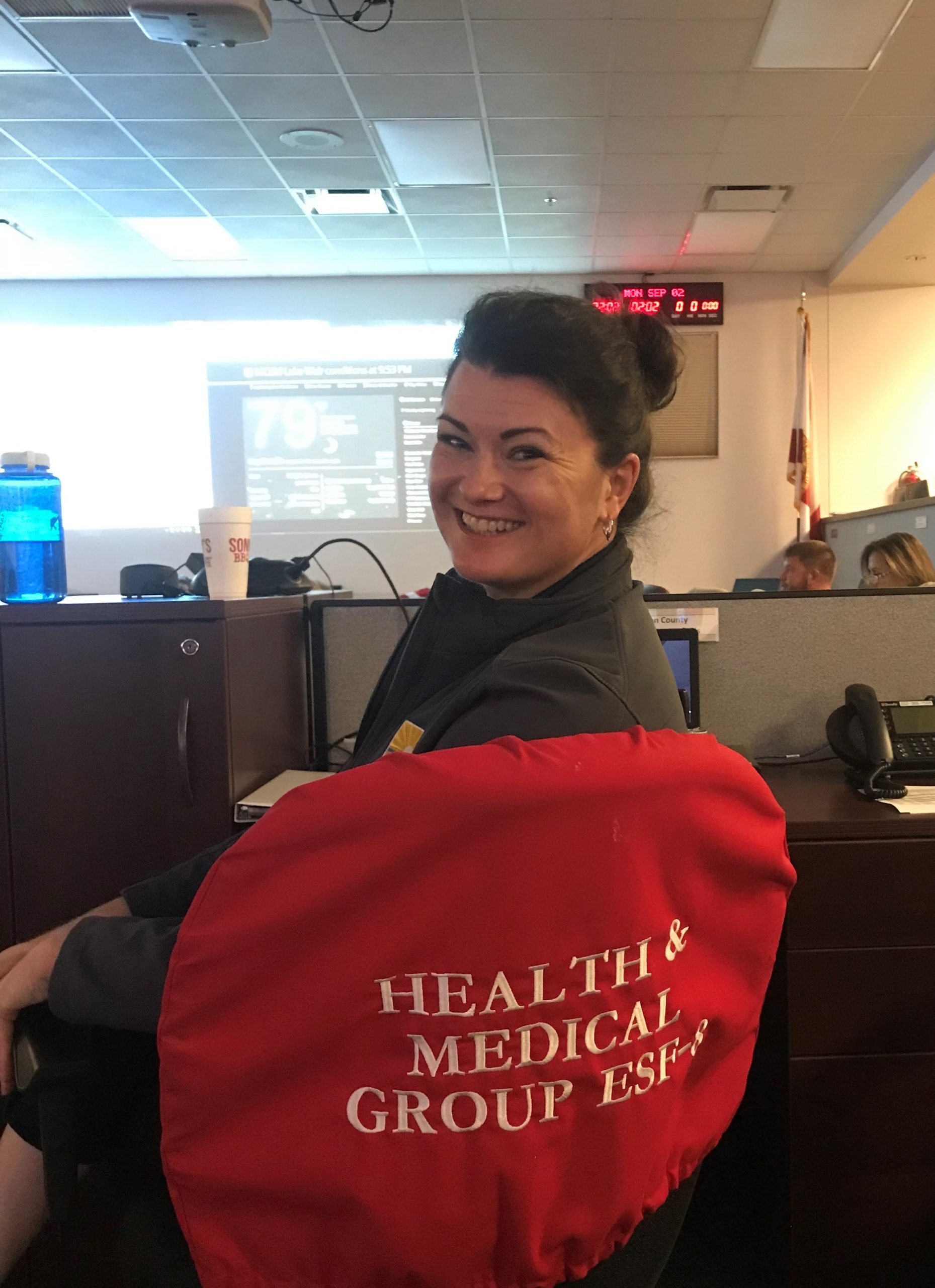
Meaghan Crowley, working at the Marion County Emergency Operations Center during Hurricane Dorian in 2019. (Pre-COVID photo courtesy of Crowley)
In addition to being the community liaison on the COVID IMT, Crowley is also in charge of monitoring and response for all long term care facilities in Marion County, such as assisted living facilities, nursing homes and rehabilitation centers. In the beginning, to prepare the facilities, Crowley made sure that the staff understood infection control procedures, what signs and symptoms to be aware of, how often they should be testing the staff and residents, and that they had the correct personal protective equipment (PPE). The staff also needed to understand what to do in case they got a COVID-19 case and how the plan changes if it’s a positive staff member versus a positive resident. She started doing daily phone calls to all of the facilities to help monitor and in case they had any questions. Then Crowley went in person to every facility to help them with their preparedness plans. Once the facilities started getting positives, she went to the facilities to do an investigation on the case and try to find out the infection source and to implement mitigation and response strategies to keep the outbreak as contained as possible. “It spreads like wildfire in these facilities and they are our most fragile individuals,” Crowley said. “The majority of Marion County deaths have been in these facilities.”
Like for most organizations, COVID-19 has shut down the majority of the normal day-to-day operations for the DOH and efforts that use to be directed towards community outreach clinics and programs have now been redirected to COVID. “The dental clinic was shut down for 6 months, so a tiny cavity or a little bit of decay, which could have been prevented or mitigated earlier on, suddenly turns into an abscess or a major infection,” Crowley said. “It also created an additional burden on the hospital system because when people couldn’t get care, they went to the Emergency Room. On top of that, overdoses tripled within the first three months of COVID.”
According to Crowley, the silver lining of the pandemic is the improvement of interprofessionalism among her coworkers. “COVID has forced us to all work together as a team, because we are in the middle of an emergency that we have never seen in our lifetime,” Crowley said. “Everyone is learning each other’s roles and it has actually brought a lot more appreciation and understanding to what the different departments do. A lot of the staff has said that it has really been a great bonding experience, incredibly stressful, but an incredible bonding experience.”
Crowley’s educational background includes a Bachelor of Science in Food Science and Human Nutrition from the University of Florida and a Master’s in Public Health from New York University. Crowley was also a part of the inaugural class of the newly revived USF Health Public Health Executive Leadership Program, designed for rising stars in the Florida Department of Health. It was through this program at USF, that Crowley met Anthony Masys, PhD and Marissa Levine, MD, MPH, faculty organizers of the program, who were very encouraging of the DrPH program. “They were absolutely incredible and inspiring,” said Crowley. “I loved having a different perspective and I loved the richness of what they were able to give.” Crowley realized that she missed academia and missed learning, especially from an academic medical center that is on the cutting-edge of technology and research. Even though she is a die-hard Gator, Crowley decided to take that next step in her career with USF because their DrPH program is top ranked in the country and she loved the kindness and support that she got from faculty even when she was just considering applying to the program.
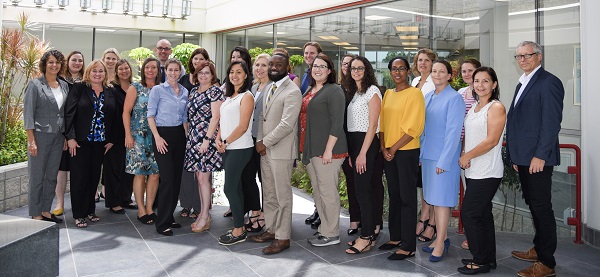
Dr. Marissa Levine, far left, and Dr. Anthony Masys, far right, flank some of the Public Health Executive Leadership Program 2019 graduates in the atrium of the COPH. (Pre-COVID photo by Caitlin Keough)
According to Crowley, in a Master of Public Health, you get the basics, but the DrPh makes you think about public health at a higher level and from a very different, more holistic perspective. Even just one semester into the program, Crowley has found the DrPH program to be incredibly helpful in her career. Being in the program helped her IMT’s plans improve and at the same time, her work experience gives her resources to conduct the research she needs to get through the program. “Since we are able to choose our own topics for our assignments, I’ve been able to choose topics that I’m actually working on at work such as making sure that the COVID responses are implemented from a health equity perspective and our vaccine roll out plan,” Crowley said.
Crowley feels that she is incredibly lucky to be at the forefront of public health and to be a part of the COVID-19 response and a part of history.
 Jennifer Loeffler-Cobia, M.S.
Jennifer Loeffler-Cobia, M.S.
Senior Researcher and Deputy Director of the National Reentry Resource Center (NRRC), American Institutes for Research
WASHINGTON, D.C. – Treatment for vulnerable populations cannot stop even during a health crisis. As part of her role as the Deputy Director of the National Reentry Resource Center (NRRC), funded through the Bureau of Justice Assistance, Loeffler-Cobia provides technical assistance to department of corrections (DOC) across the country. “Specifically pertaining to the pandemic, I work with DOCs to identify challenges the system is currently facing when trying to balance evidence-based practices implementation, community safety, and the health of staff and those being served; innovations that the system is trying to implement to help overcome their challenges; and identify lessons learned to help their systems improve policies, procedures, and program to better prepare for future implementation readiness during a crisis of this magnitude,” said Loeffler-Cobia.
Implementation readiness has always been a part of the way Loeffler-Cobia works with systems trying to implement policies and interventions, but COVID-19 brought to the forefront the importance of that framework and highlighted some areas that needed improvement. “We want this population to be able to have the education and the resources not only to be able to succeed when they return to their communities and families, but also understand how to prevent the spread of COVID-19 and have access to the necessary health, employment, treatment, and housing resources,” said Loeffler-Cobia.
Her educational background includes a Bachelor of Science in Public Health and a Master of Science in Health, both from Utah State University. Loeffler-Cobia wanted to focus on advancing her leadership skills to help impact system change and so in August 2020, she enrolled in USF Health’s DrPH program to help bring her personal and professional plans to fruition and further her professional career. “I have always had a passion for public health, substance mis-use prevention and treatment, and overall just helping to provide a better quality of life for vulnerable populations,” said Loeffler-Cobia. She was accepted into all of the programs she applied to, but she chose USF because she felt the staff and curriculum were the best match with her professional interests. “The USF doctoral in public health curriculum will equip me with the requisite tools for developing, implementing, and evaluating evidence-informed public health approaches that are relevant in preventing and reducing substance mis-use and school and community violence, and incorporating these approaches to assist with juvenile and criminal justice system change,” said Loeffler-Cobia.
 Rachel Guran, MPH, BSN, RN, CIC
Rachel Guran, MPH, BSN, RN, CIC
Director of Epidemiology and Infection Prevention, Memorial Healthcare System
HOLLYWOOD, FL – Prior to COVID-19, the name Rachel Guran might have been unknown to some of the staff at Memorial Healthcare System. Now, “every department knows who I am and how important infection control is in a healthcare system,” said Guran. Not only is Guran a role model for public health safety inside Memorial Healthcare System, but she also represents Memorial out in the community, often quoted as the subject expert on COVID and influenza prevention in local blogs, newspapers, and social media posts. “As the system director for all infection prevention activities, I have been involved in creating all hospital policies and procedures related to COVID including anything having to do with personal protective equipment and infection prevention and control steps to prevent the spread of COVID amongst the healthcare workers and patients,” said Guran. Hospitals are run with multidisciplanary teams on an everyday basis and it’s especially important when it comes to infection control. “Every team member in a hospital has a responsibility for ownership of infection control – hand washing and preventing cross contamination,” said Guran.

Rachel Guran (back left) was part of a live press briefing about the coronavirus crisis in Florida with Governor Ron DeSantis on West Palm Beach News, an NBC-affiliated television station. (Photo courtesy of Guran)
In August 2020, Guran enrolled in USF Health’s DrPH program with a concentration in Advanced Practice Leadership. “Hospital epidemiology and infection prevention is a growing part of the public health world. I would like to give back to our profession through translating our bedside experience into research and public policy,” said Guran. Her educational background includes a Bachelor of Science in Psychology, a Master of Public Health in Health Promotion and Disease Prevention, and a Bachelor of Science in Nursing. Guran decided to pursue a Doctorate because it’s, “a rigorous coursework that signifies true leadership and expertise in a chosen field of study,” said Guran. She chose USF Health’s program because of the national recognition in Public Health training with professors that are leaders in the field.
Even though Guran just recently started the program, she has already been able to apply some of the lessons to the real-world setting and says that working towards a Doctor of Public Health during a pandemic is a unique experience because it can be examine from a scholarly standpoint as it’s happening. She also appreciates the connections to her classmates that have allowed her to work on real-world activities with the Florida Department of Health and the Centers for Disease Control (CDC).
Being the Director of Epidemiology and Infection Prevention for Memorial Healthcare System is Guran’s dream job and she couldn’t think of a better career.
